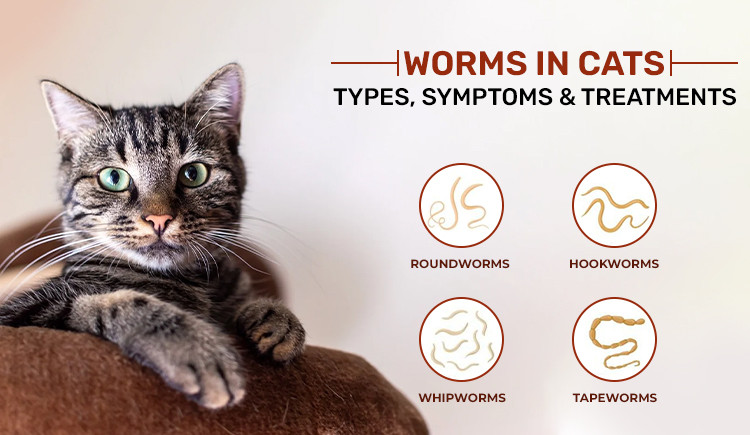
Cats are susceptible to several kinds of worm infestations. If left untreated, these worms can make your kitty terribly ill. Fortunately, you can protect your cat from worms by identifying the signs of worm infestation at an early stage and by following a regular deworming routine for your cat.
In this article, we have discussed everything you need to know about worms in cats, including the common types of worms in cats, their symptoms, and how to deworm cats. So, let’s dive into the details without any further delays.
How Do Cats Get Worms?
Your cat or kitten can easily get worms from their environment. Here are some of the common ways in which cats get infested with worms:
• From fleas carrying worm larvae
• By coming into contact with infected stools of other animals
• Through shared litter boxes with infected cats
• Ingested worm larvae or worms from the environment or food
• Eating worm-infected prey like birds or mice
• Through the mother’s milk (in case of kittens)
Common Types of Worms in Cats
There are many common types of worms that infect cats; these include:
Roundworms:
Roundworms are the most common type of worm in cats and kittens. These long, spaghetti-like worms that appear like white earthworms infect the cat’s intestines.
Hookworms:
Hookworms have a hook-like structure through which they attach to gastrointestinal tract. Hookworm infections can cause bleeding and are fatal.
Tapeworms:
There are two types of tapeworm infections in cats: flea tapeworms and cat tapeworms. They are long, flat, segmented worms that attach themselves to the gut.
Lungworms:
Lungworms are not gastrointestinal worms, but they cause significant respiratory problems in cats. The adult lungworms infect and reside in the cat’s lungs.
Whipworms:
Although not common, whipworm infestations in cats are painful. Whipworms cause digestive problems and diarrhea in cats.
Also Read- Roundworms in Cats: How to Keep Your Feline Friend Safe and Healthy
Symptoms of Worm Infestation in Cats
If your cat is infested with worms, you may occasionally find them in the cat poop. To diagnose what exact type of worm your cat is infested with, your veterinarian may recommend specific tests of the fecal sample. However, there are many other signs of worm infections in cats that will help you detect worms, such as:
• Presence of worms around their bottom (tapeworms)
• Weight loss
• Itchy bottom
• Diarrhea
• Potbelly appearance
• Vomiting
• Poor appetite
• Dull coat
• Coughing or wheezing
How to Treat & Prevent Worms in Cats
If you diagnose a worm infection in your cat, it is essential to provide them with timely treatment to save them from further discomfort. Moreover, it is important to note that sometimes the infected cats may not show any obvious symptoms. Therefore, maintaining a regular deworming cat routine is a great way to prevent worm infestations in cats.
Cat worms can be treated with deworming treatments that are available in the market on the form of tablets, syrups, pastes, or topical spot-ons. Most of these treatments are designed to treat and prevent all common types of worms, including tapeworms, roundworms, hookworms, lungworms, etc.
Best Deworming Products for Cats
If you are looking for an effective deworming treatment for your cat, you can consider the popular and reliable options available, including the following:
- Milbemax
- Bob Martin VetCare Dewormer
- Triworm-C
- Panacur Granules
- Antezole Deworming Paste
How Often Should You Deworm a Cat?
Now that you have the best worming treatment for cats on your list, the next question is, how often should you deworm your cat? So, according to a general rule, kittens should be dewormed every 2 weeks between the age of 2-12 week, and thereafter, every 3-4 months for the rest of their lives. However, we recommend consulting your veterinarian for your cat’s deworming schedule, as it may differ as per your cat’s health conditions, age, and geographical location.
FAQ
1. How do I know if my cat has worms?
Common signs of worms in cats include weight loss, vomiting, diarrhea, a pot-bellied appearance, visible worms or segments in stool, itchy bottom, dull coat, and coughing or wheezing. In some cases, cats may not show obvious symptoms, so a veterinary fecal examination is the best way to confirm worm infestation.
2. How do I get rid of worms in cats?
The most effective way to eliminate worms in cats is by using vet-recommended deworming treatments, available as tablets, pastes, syrups, or spot-on solutions. Popular options include Milbemax, Bob Martin VetCare Dewormer, Triworm-C, and Panacur Granules. Always consult your vet to choose the right dewormer and follow the recommended dosage schedule.
3. Can I touch my cat if she has worms?
Yes, you can touch and care for your cat, but practice good hygiene. Wash your hands thoroughly after handling your cat, especially before eating or touching your face. Some types of worms can be transmitted to humans (zoonotic), so regular deworming and cleaning litter boxes are important preventive measures.
4. How long can a cat live with intestinal worms?
A healthy adult cat may live for some time with a mild worm infestation, but chronic or severe worm infections can cause serious health problems, including anemia, malnutrition, and intestinal damage. If left untreated, worms can shorten a cat’s lifespan. Early detection and regular deworming are key to maintaining your cat’s health and longevity.
Conclusion
Worm infestations in cats are more common than many pet parents realize, and if left untreated, they can lead to serious health issues. By recognizing the early signs, following a regular deworming schedule, and consulting your veterinarian for the right treatment, you can keep your feline friend healthy, happy, and worm-free.
Prevention is always better than cure — make deworming an essential part of your cat’s routine and protect them from harmful parasites.

